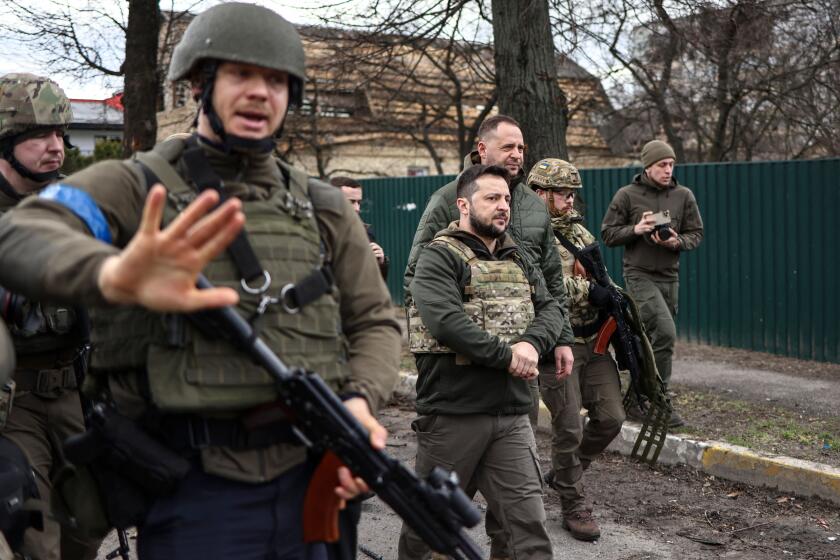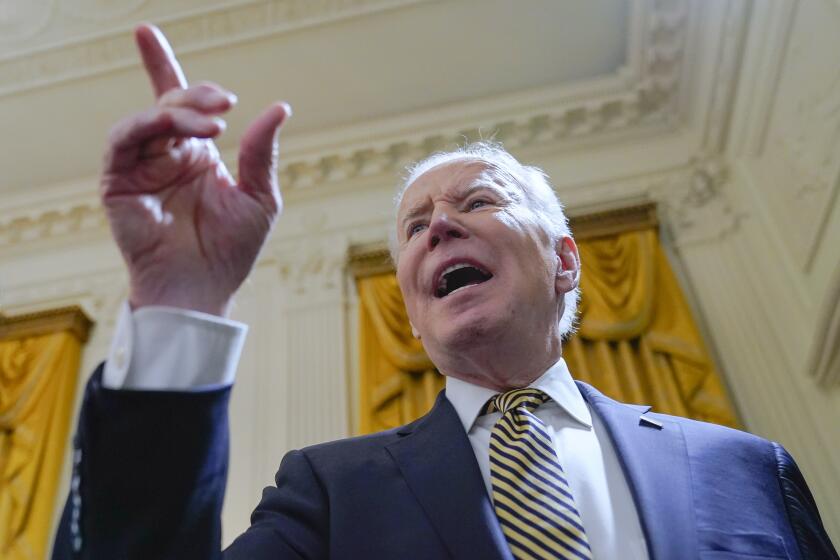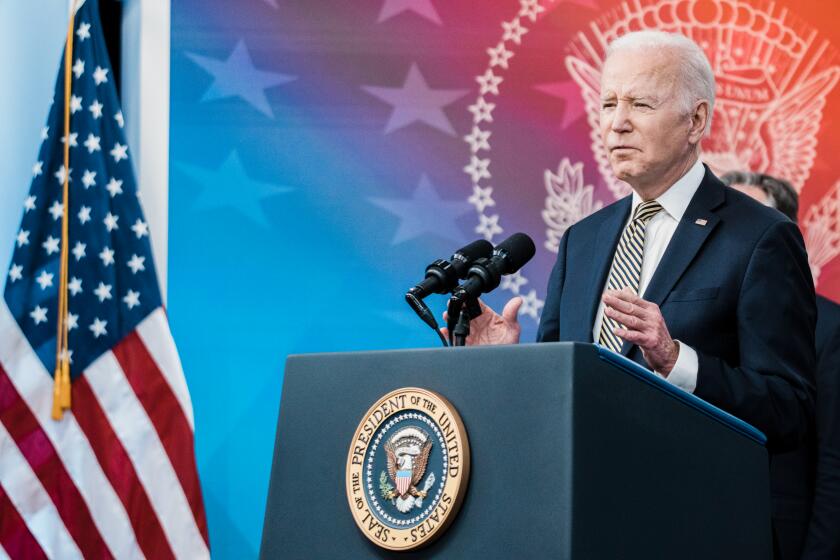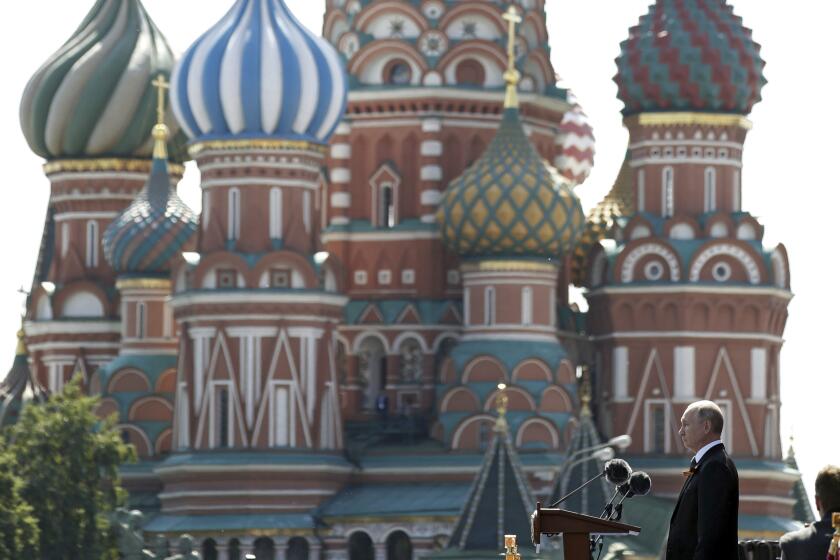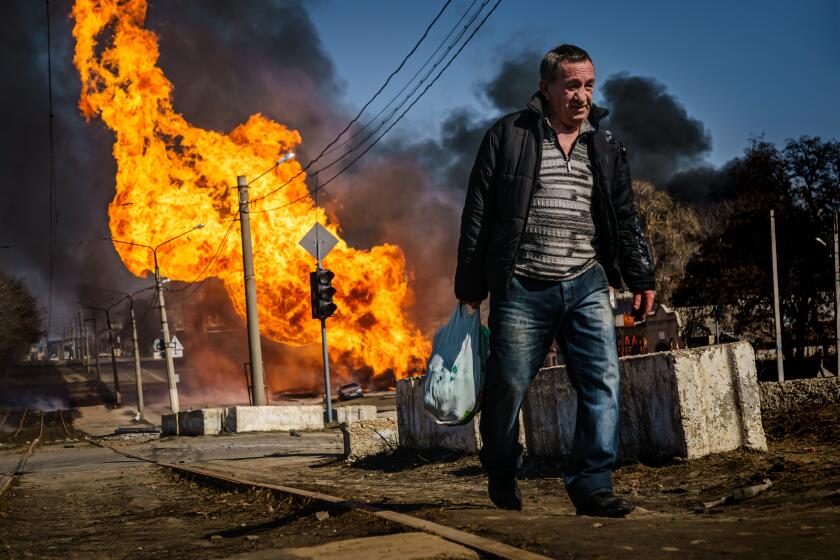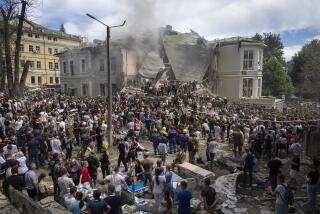Theater where hundreds had sheltered wrecked in Russian airstrike, Ukrainian officials say
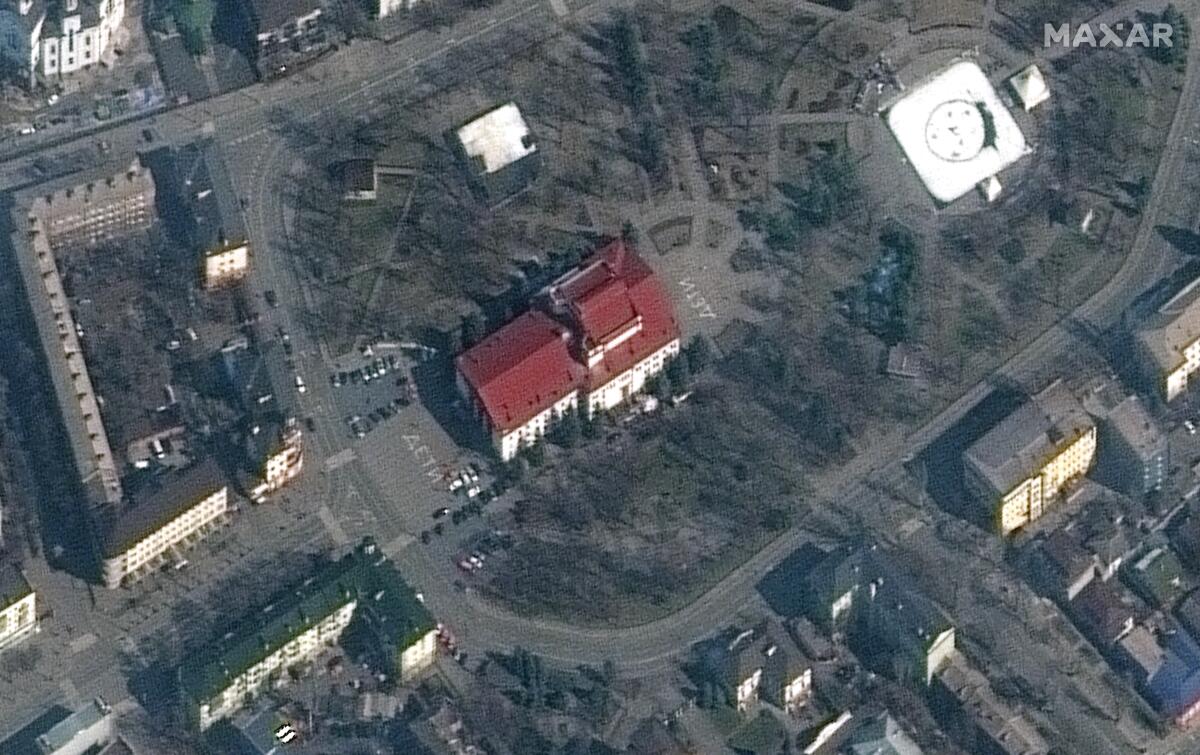
KYIV, Ukraine — A Russian airstrike hit a theater in Mariupol where hundreds of people had taken shelter in recent days as a siege on the southern port city tightened, Ukrainian officials said Wednesday, but there was no immediate word on casualties.
If large numbers of civilians were inside in the building — shown by satellite imagery earlier in the week to have the word “children” marked in large letters on the ground in front and at the back of it — it could prove one of the worst atrocities of the 3-week-old conflict.
Ukrainian Foreign Minister Dmytro Kuleba posted before-and-after photos of the stately, white-columned Drama Theater in the heart of the Russian-encircled city, saying that “hundreds of innocent civilians were hiding” within its walls. Mariupol, under heavy bombardment, was already the venue for some of the war’s most harrowing reports of suffering.
Writing on Twitter, Kuleba called the theater attack a “horrendous war crime,” but he did not say whether those who had taken refuge were thought to have been inside when the building was hit or had managed to flee. Earlier, the Mariupol City Council said in a post on the messaging app Telegram that it was “still impossible to estimate the scale of this horrific and inhumane act.”
Russia’s Defense Ministry denied involvement and sought to cast blame on a right-wing Ukrainian militia, the state-run RIA news agency reported.
Earlier, an around-the-clock curfew brought the Ukrainian capital, Kyiv, to a standstill and Russian forces stepped up fierce attacks on civilian areas across the country Wednesday. Casualties and damage were reported in Kyiv, Kharkiv and other Ukrainian cities.
A woman reacts as she stands in front of a house burning after being shelled in the city of Irpin.
President Biden on Wednesday echoed growing international condemnation of the wholesale leveling of civilian areas by Russian President Vladimir Putin’s forces. “I think he’s a war criminal,” Biden said of the Russian leader, the first time he had publicly made such a characterization.
White House Press Secretary Jen Psaki said Biden was “speaking from his heart” about televised scenes of “barbaric actions,” but did not specify a particular incident that had prompted the president’s remark. The Kremlin called the accusation “unacceptable.”
With a spiraling humanitarian and refugee crisis arising from the fighting, Putin sought to bat aside assessments by Western military officials and analysts that his forces had become bogged down in their attempt to speedily subdue Ukraine. At a televised government meeting, he insisted that what Russia calls its “special military operation” was going successfully and according to plan.
President Biden has flatly called Vladimir Putin a ‘war criminal’ after Russia bombed hospitals and maternity wards in Ukraine.
At the same time, the U.S. and Russia engaged in their highest-level encounter since Russia invaded its neighbor on Feb. 24. Jake Sullivan, the White House national security advisor, talked by phone Wednesday with Gen. Nikolai Patrushev, head of Russia’s security council, and a spokeswoman said Sullivan warned against any Russian use of chemical or biological weapons in Ukraine.
Ukrainian President Volodymyr Zelensky, meanwhile, kept up his string of appeals to allies around the world for more forceful action and more weaponry. In a video speech to the U.S. Congress, he requested additional military aid and heavier sanctions on Russia, and repeated his request for a no-fly zone over Ukraine — an appeal rejected again Wednesday by NATO’s chief.
After a meeting of North Atlantic Treaty Organization defense ministers in Brussels, the alliance’s secretary general, Jens Stoltenberg, said a no-fly zone would risk sparking a wider war.
“NATO should not deploy forces on the ground or in the airspace over Ukraine because we have a responsibility to ensure that this conflict, this war, doesn’t escalate beyond Ukraine,” he said.
Ukraine’s Volodymyr Zelensky urged the U.S. to help his nation fight back against Russian forces. Biden’s swift response reflected political pressure.
In Kyiv, plumes of smoke rose Wednesday from a 12-story apartment building in the Shevchenkivskyi district, just a few miles northwest of the city center, after Russian shelling left at least two people injured in a predawn attack. Several floors became engulfed in flames, and the top floor was destroyed.
In the northeastern city of Kharkiv, Ukraine’s second-largest, two people were found dead and four were injured after artillery destroyed two residential buildings, Ukrainian officials said. Part of a school building was also damaged early Wednesday.
In Chernihiv, about 80 miles northeast of the capital, 10 people were shot and killed while standing in line for bread, the U.S. Embassy in Kyiv said on Twitter.
The assaults took place as a third day of negotiations was set to begin between Ukraine and Russia, the latest attempt to broker peace after the two sides failed to reach agreement during multiple rounds of previous talks.
Ukrainian President Zelensky’s address to Congress was simultaneously translated into English by his interpreter. Here is the full text.
In an early-morning video, Zelensky said that the demands of both nations were sounding “more realistic.” But he said that “time is still needed for the decisions to be in the interests of Ukraine.”
In Moscow, Russian Foreign Minister Sergei Lavrov agreed that a “business-like spirit” had begun to mark the talks. He told Russian channel RBK TV that “a neutral status [for Ukraine] is being seriously discussed in connection with security guarantees,” but there was no confirmation of that from Kyiv.
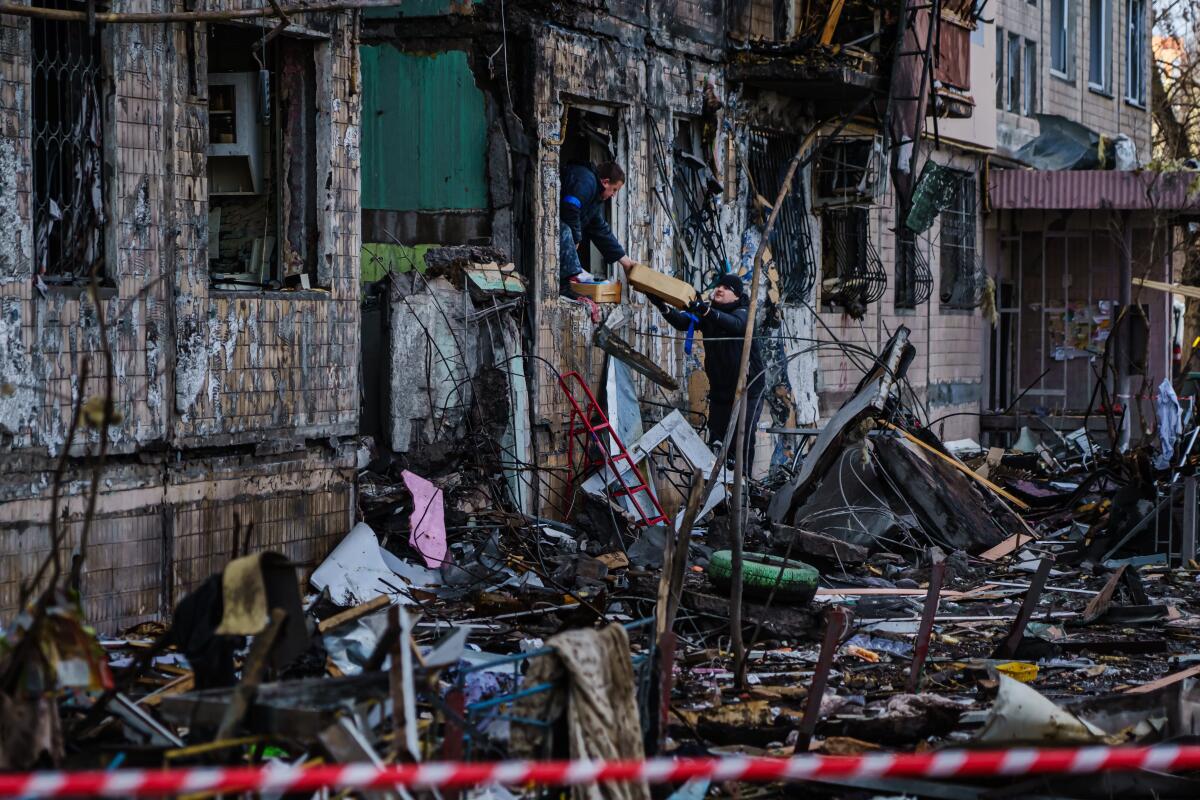
Russia owes billions to foreigners in dollar-denominated bonds but might fail to pay up because of the heavy sanctions on it from the war on Ukraine.
It’s unclear how much an outpouring of U.S. and Western assistance will help Ukraine, which has impressed the world by fending off a bigger, more militarily advanced enemy, but also suffered hundreds of deaths and severe losses of territory, especially in the east and south. Outside Mariupol, desperately needed aid convoys have been blocked in recent days.
In Washington, a senior Defense official said that the Pentagon has “reason to believe the Russians are considering their resupply and manning options,” but added that there was “no evidence” of Russian efforts to bring in additional supplies.
While he tries to rally more international support, Zelensky has appeared to shift on the key issue of NATO membership for Ukraine, pursuit of which is enshrined in the country’s constitution. On Tuesday, he said he accepted that his nation would not join the transatlantic alliance.
“It is clear that Ukraine is not a member of NATO — we understand this,” Zelensky said in a speech to the Joint Expeditionary Force, a British-led group of 10 northern European countries committed to rapid crisis response. “For years we heard about the apparently open door but have already also heard that we will not enter there, and these are truths and must be acknowledged.”
Putin has demanded that Ukraine never join the alliance and cited Kyiv’s desire to do so as a sign of Western aggression toward Russia.
The Times’ Marcus Yam, no stranger to war photography, gives a first-person account from Ukraine.
On Wednesday, British Prime Minister Boris Johnson said he agreed with Zelensky. There’s “no way Ukraine is going to join NATO anytime soon,” Johnson said during a visit to Abu Dhabi, in the United Arab Emirates.
Mykhailo Podolyak, an advisor to Zelensky who is taking part in negotiations, tweeted Wednesday that “our position at the negotiations is quite specific,” saying Ukraine needed “legally verified security guarantees; cease-fire; withdrawal of Russian troops.”
He also suggested that Russians were more likely to negotiate because of Ukrainian counteroffensives. In a “PBS NewsHour” interview, Podolyak said Russia was making “adjustments” to its demands because “they see the war is not going according to their plans.”
“They were planning to move in their troops, capture as much territory as possible in three days and basically have a blitzkrieg,” he said in the interview. “They did not do that, and they will not do that. They are stuck fighting in their current positions.... Therefore, we have much confidence that we will have a cease-fire in coming days.”
In Kyiv, residents said it felt like the danger was getting closer even though Russian troops haven’t made deep inroads into the city, and routes in and out remained open.
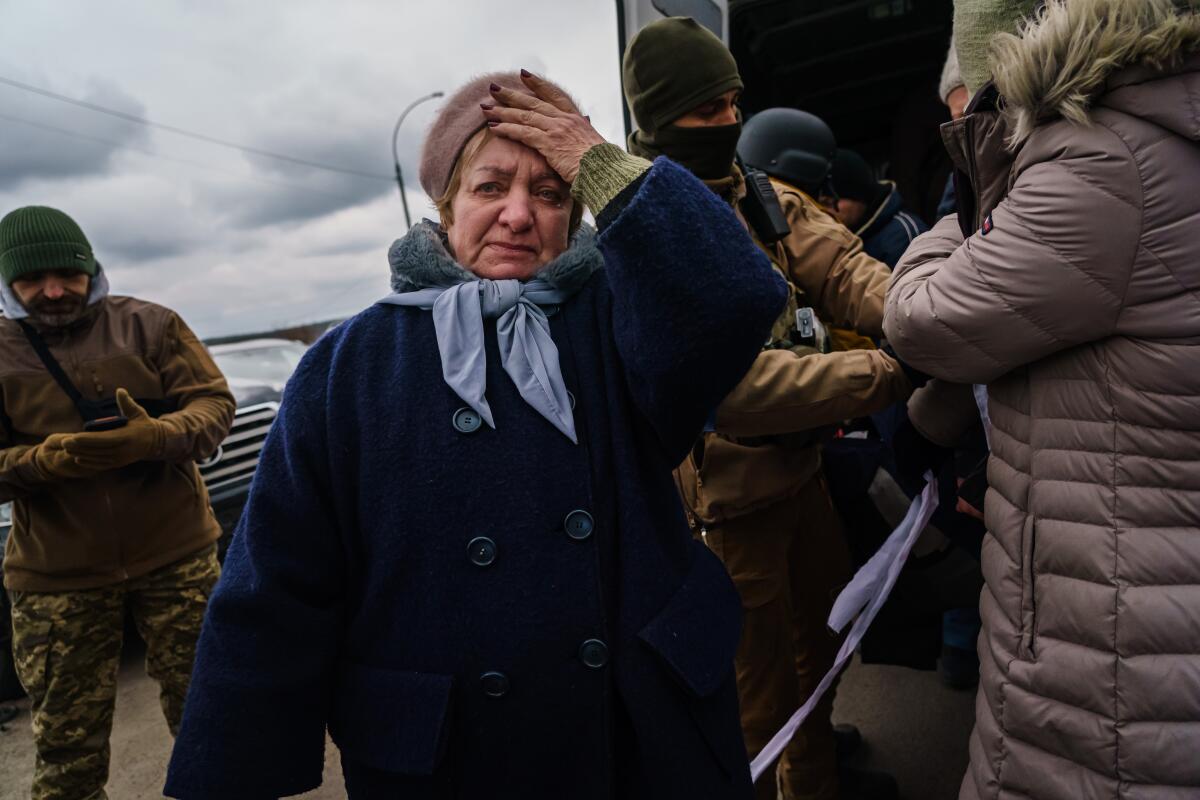
Maria Zhartovska, a 31-year-old journalist who works for the news website Babel.ua, said she awoke “to the sounds of explosions” for the second day in a row. She lives near the Lukyanivska subway station, which is three miles from Zelensky’s office and was shut down after Russian shelling damaged it Tuesday.
“By morning, we heard the air raid sirens five times,” Zhartovska said.
As afternoon came, a series of loud explosions rumbled through the city center, where the occasional car still drove on streets devoid of pedestrians.
The city’s curfew, imposed Tuesday evening because of what Mayor Vitali Klitschko described as a “dangerous moment” in the capital, is to end Thursday.
Bulos reported from Kyiv, Kaleem from London and King from Washington. Times staff writers Eli Stokols and Anumita Kaur in Washington contributed to this report.
More to Read
Sign up for Essential California
The most important California stories and recommendations in your inbox every morning.
You may occasionally receive promotional content from the Los Angeles Times.
